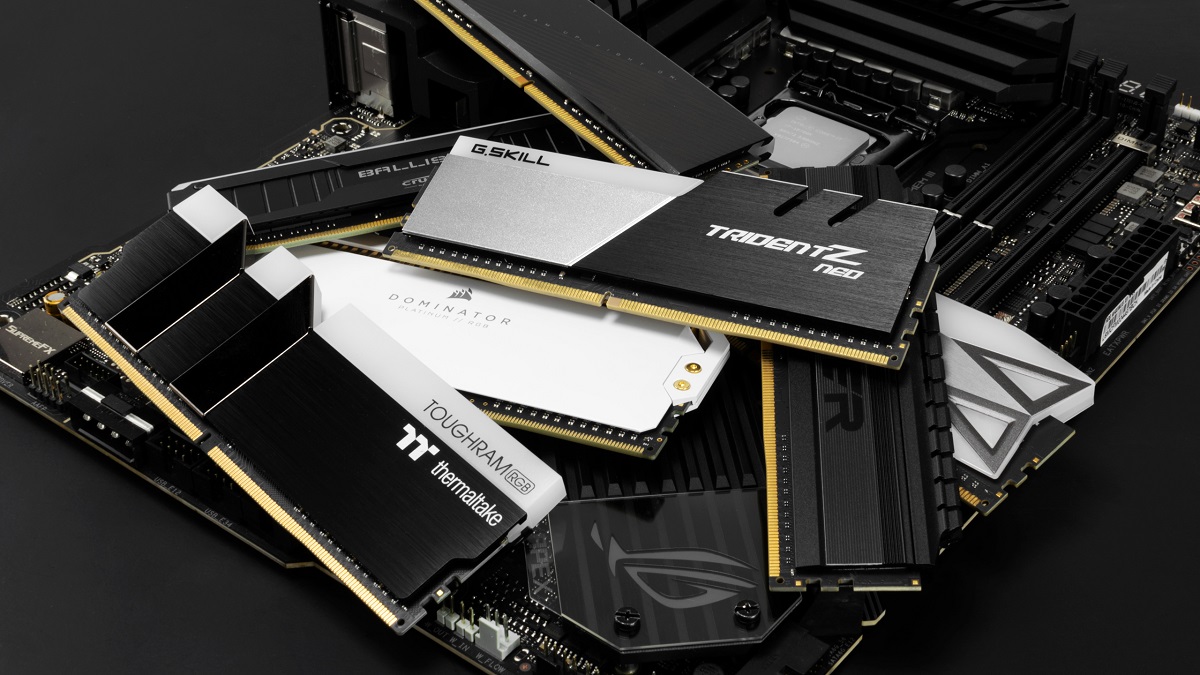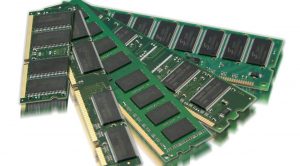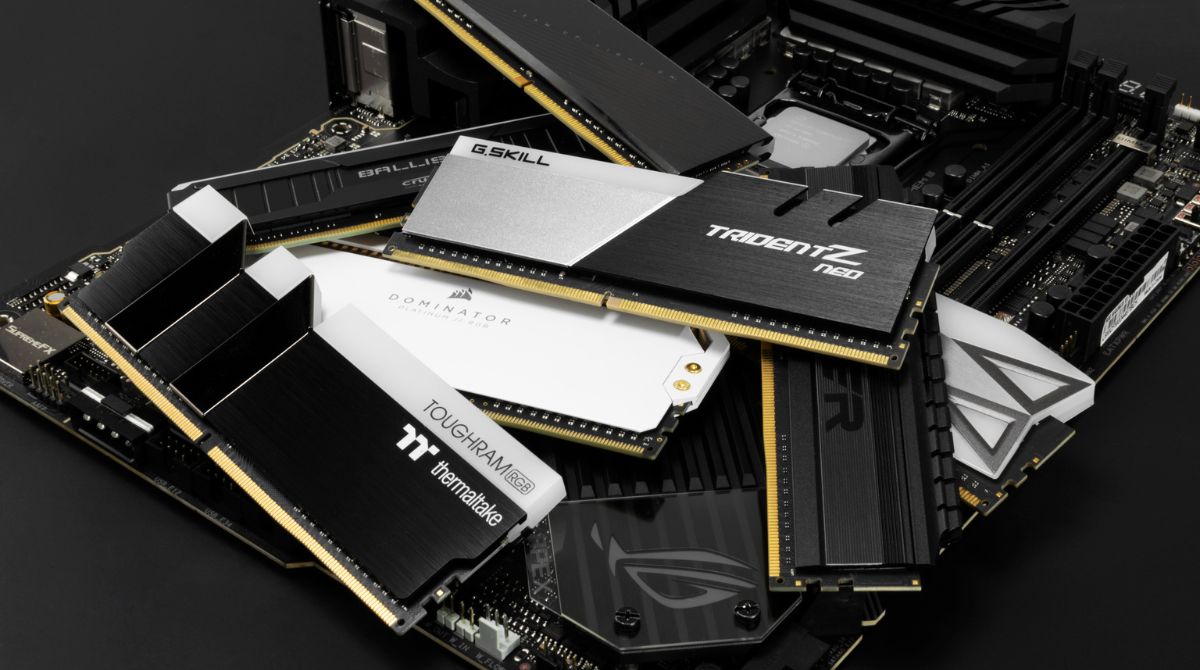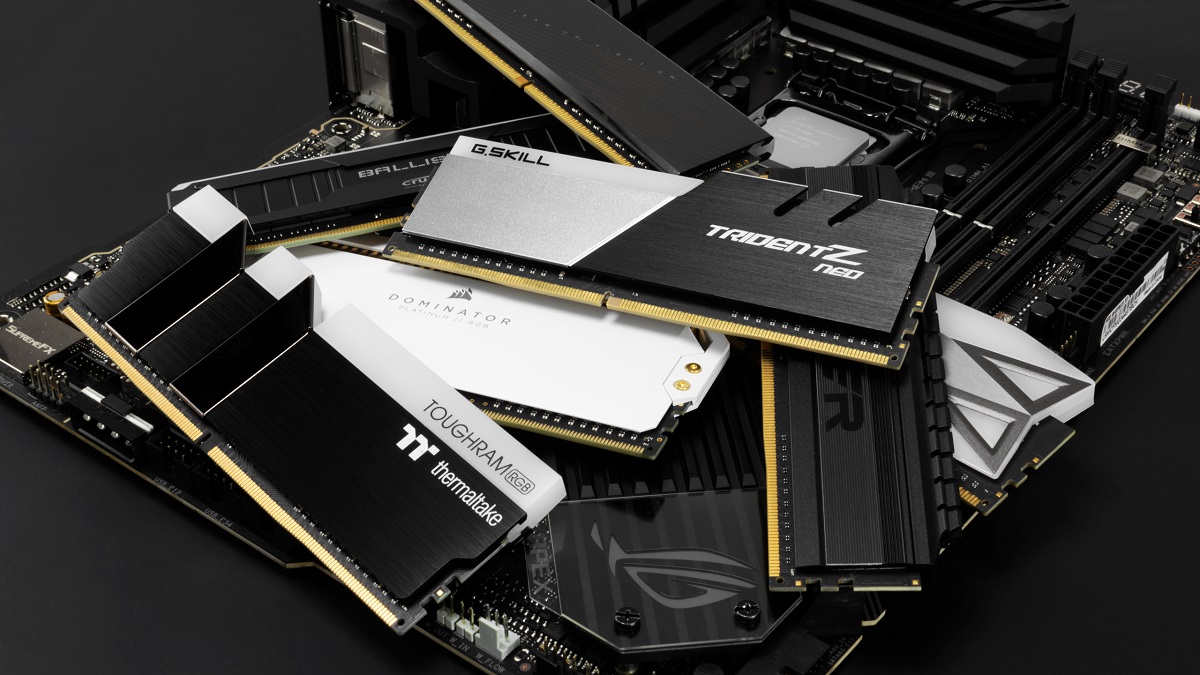Introduction
Welcome to the world of gaming! Whether you’re a casual gamer or a hardcore enthusiast, building a gaming PC that delivers high-performance is essential for an immersive gaming experience. While components like the graphics card and CPU often steal the spotlight, one crucial element that shouldn’t be overlooked is RAM (Random Access Memory). RAM plays a crucial role in determining how smooth and efficient your gaming PC will run.
Understanding the importance of RAM and how much you need can be confusing, especially for those new to the world of gaming PCs. That’s why we have put together this comprehensive guide to help you determine the optimal amount of RAM for your gaming needs.
RAM is a type of computer memory that allows your system to store and access data quickly. Think of it as your PC’s short-term memory, constantly juggling the information needed to run your games. The more RAM you have, the more data your PC can store and access, resulting in better overall performance and smoother gameplay.
When it comes to gaming, RAM plays a critical role in ensuring that your games run smoothly without stuttering, lagging, or freezing. It not only affects the loading times but also impacts the game’s overall responsiveness, graphical quality, and the ability to run multiple tasks simultaneously.
Now, let’s delve into the details of how much RAM you actually need for a gaming PC. Keep in mind that the amount of RAM you require can depend on several factors, including the types of games you play, the resolution you game at, and the overall performance level you desire.
Understanding RAM
Before we dive into determining how much RAM you need for a gaming PC, it’s essential to understand the basics of RAM and how it functions. RAM, or Random Access Memory, is a type of volatile memory that serves as a temporary storage space for your computer’s data and instructions.
Unlike the long-term storage provided by your hard drive or solid-state drive (SSD), RAM provides rapid access to the data that your CPU needs to perform tasks. When you launch a game, the game’s files and instructions are loaded into the RAM so that your CPU can quickly access them as needed. The more RAM you have, the more space you have to store these game files and instructions, resulting in improved performance.
RAM is measured in gigabytes (GB) and is available in different speeds and types. The most common types of RAM are DDR4 (Double Data Rate 4) and DDR3 (Double Data Rate 3). DDR4 RAM is the latest generation and offers faster speeds and improved efficiency compared to DDR3.
It’s worth noting that RAM is distinct from your computer’s storage capacity. While storage devices have a significant impact on the amount of data you can store long-term, RAM is focused on providing quick access to data during the active operation of your system.
When gaming, RAM serves as a temporary workspace for your CPU, allowing it to quickly access game assets, textures, and other data. Think of it as a desk where your CPU can lay out the files it needs for immediate use. The more RAM you have available, the larger this workspace, enabling your CPU to work more efficiently and reducing the need for frequent data transfers between RAM and storage devices.
Having a sufficient amount of RAM is particularly important for modern games, which are becoming increasingly demanding in terms of memory requirements. Games with high-resolution textures, intricate game worlds, and extensive asset libraries can put a strain on your system’s RAM capacity. If your PC lacks sufficient RAM, it may lead to performance issues, such as stuttering, frame drops, and longer loading times.
Now that we have a better understanding of RAM and its role in gaming performance, let’s move on to exploring how much RAM you actually need for a gaming PC.
RAM and Gaming PC Performance
RAM plays a crucial role in determining the overall performance of your gaming PC. It directly affects how smoothly your games run, how quickly they load, and how many applications you can run simultaneously without impacting performance. Let’s explore how RAM impacts various aspects of gaming PC performance.
One of the primary benefits of having sufficient RAM is improved game loading times. When you launch a game, it needs to load various files and assets into the RAM before it can be played. With more RAM available, the game can load these files faster, reducing the time you spend waiting for the game to start. This is especially beneficial for open-world games or those with complex and detailed environments.
RAM also plays a significant role in the smoothness of your gameplay. It ensures that your CPU has enough space to store and access the data it needs in real-time. Without sufficient RAM, your CPU may struggle to keep up with the demands of the game, leading to lag, stuttering, and frame rate drops. Upgrading your RAM can help alleviate these issues and provide a smoother gaming experience.
In addition to gameplay performance, RAM affects the multitasking capabilities of your gaming PC. If you enjoy streaming your gameplay on platforms like Twitch or recording your sessions, having more RAM allows your PC to handle both gaming and streaming/recording software simultaneously without a significant impact on performance.
Furthermore, having sufficient RAM is essential for running other applications in the background while gaming. Many gamers like to have chat applications, music players, or web browsers open while gaming. With more RAM, you can run these additional applications without experiencing a noticeable decline in gaming performance.
It’s important to note that while RAM is crucial for gaming performance, there is a limit to how much it can improve performance. Once you have enough RAM to handle the demands of your games and multitasking needs, adding more RAM beyond that point will have diminishing returns. Other components, such as the CPU and graphics card, also play significant roles in gaming performance and should be considered alongside RAM upgrades.
With a good understanding of how RAM affects gaming PC performance, let’s move on to the minimum RAM requirements you should consider when building a gaming PC.
Minimum RAM Requirements for Gaming
When it comes to gaming, having enough RAM is essential to ensure optimal performance. While the actual minimum RAM requirements can vary depending on the specific games you play, there are general guidelines you can follow to ensure a smooth gaming experience.
For most modern games, the minimum recommended RAM is 8GB. This amount of RAM should be sufficient to run most games smoothly, provided you have a capable CPU and graphics card. It allows for efficient loading times, minimizes frame rate drops, and enables multitasking with basic applications in the background.
However, it’s important to note that the minimum RAM requirements can vary from game to game. Some demanding titles, especially those with high-resolution textures and detailed game worlds, may recommend 16GB or even 32GB of RAM for optimal performance. It’s always a good idea to check the system requirements of the games you want to play to ensure you meet or exceed the recommended RAM specifications.
Another factor to consider is the operating system you are using. Windows 10, for example, requires a minimum of 4GB of RAM to run smoothly. Therefore, even if a game specifies 8GB of RAM as the minimum requirement, you need to account for the RAM usage of the operating system as well.
Additionally, if you plan on running multiple applications simultaneously while gaming, such as voice chat programs or web browsers, it’s recommended to have at least 16GB of RAM. This provides enough headroom for smooth multitasking without impacting gaming performance.
While the minimum RAM requirements serve as a guideline, it’s always beneficial to have more than the minimum if your budget allows. Investing in 16GB of RAM or even 32GB can future-proof your gaming PC and ensure it can handle upcoming demanding games. It also provides a buffer for any background processes or applications that may use additional RAM.
Now that we’ve covered the minimum RAM requirements, let’s move on to the recommended RAM for gaming. Remember that meeting the minimum requirements should be seen as the absolute minimum, and having more RAM can greatly enhance your gaming experience.
Recommended RAM for Gaming
While the minimum RAM requirements provide a baseline for gaming, having more RAM can greatly enhance your gaming experience. With today’s demanding games and resource-intensive applications, it’s advisable to aim for higher amounts of RAM to ensure optimal performance and future-proof your gaming PC.
For most gamers, a recommended amount of RAM is 16GB. This amount provides a significant performance boost and allows for smooth gameplay even with resource-intensive games. It offers ample space for the game to load its assets, ensures minimal lag or stuttering, and enables efficient multitasking with other applications running in the background.
Having 16GB of RAM also helps future-proof your gaming system. As game requirements continue to increase over time, having more memory available will allow you to meet the demands of future titles without having to upgrade your RAM immediately.
If you are a content creator or frequently engage in resource-intensive tasks such as video editing or 3D rendering, consider upgrading to 32GB of RAM. This amount of RAM provides the necessary headroom for running demanding applications while gaming simultaneously, without compromising performance in both.
It’s worth noting that the amount of RAM you require can vary depending on other factors such as the resolution you game at, the complexity of the game worlds, and the specific applications you use. Higher resolutions, such as 1440p or 4K, typically require more RAM to store the additional textures and assets required for the higher level of detail.
Another consideration is whether you plan to use your gaming PC for virtual reality (VR) gaming. VR games often demand more resources, including RAM, to provide a smooth and immersive experience. For VR gaming, having 16GB or more of RAM is highly recommended to ensure optimal performance and avoid any performance-related issues.
In summary, while 16GB of RAM is the recommended amount for most gamers, considering 32GB if you engage in resource-intensive tasks or plan to use VR gaming can provide a significant performance advantage. Remember, having more RAM than the minimum requirements allows your gaming PC to run games smoothly, facilitates multitasking, and future-proofs your system for upcoming demanding titles.
Next, let’s explore the concept of overclocking and how it relates to RAM in a gaming PC.
Overclocking and RAM
Overclocking is the process of increasing the clock speed of a component beyond its default settings to achieve higher performance. When it comes to RAM, overclocking involves running the memory modules at faster speeds than their rated specifications. This can lead to improved overall system performance and faster data transfer rates.
Overclocking your RAM can have a significant impact on gaming performance. By increasing the clock frequency, you can reduce the time it takes for data to be read from or written to the RAM, resulting in faster load times and improved responsiveness in games.
It’s important to note that not all RAM modules are designed to handle overclocking. The ability to overclock RAM depends on the quality and specifications of the modules themselves. It is recommended to invest in RAM modules that are specifically marketed as being suitable for overclocking if you plan to pursue this route.
One popular method of overclocking RAM is by adjusting the timing settings in the system’s BIOS (Basic Input/Output System). These timing settings control how long the RAM takes to perform specific functions, such as accessing data. Fine-tuning these timing settings can further optimize RAM performance and enhance gaming performance.
While overclocking your RAM can provide performance benefits, it also comes with some risks. Overclocking can potentially cause instability in your system if not done correctly. It may result in system crashes, freezes, or even damage to the RAM modules if excessive voltage or incorrect settings are applied.
To safely overclock your RAM, it is recommended to research and follow comprehensive guides specific to your motherboard and RAM modules. Additionally, stress-testing tools can help ensure the stability of your overclocked RAM by running intensive tests to check for any errors or system instabilities.
It’s worth mentioning that not all gaming PC users may be interested in or comfortable with overclocking. If you prefer a more straightforward and hassle-free approach, purchasing RAM modules with higher clock speeds or opting for higher-capacity modules can still provide significant performance gains without the complexities of overclocking.
Overall, overclocking your RAM can be an effective way to squeeze out extra performance from your gaming PC. However, it requires careful consideration, research, and understanding of the potential risks involved. If done correctly, overclocking your RAM can provide noticeable improvements in gaming performance, reducing load times, and enhancing overall responsiveness.
Now, let’s move on to discussing how to choose the right RAM for your gaming PC.
Choosing the Right RAM for Your Gaming PC
Selecting the right RAM for your gaming PC is crucial to ensure optimal performance and compatibility. Here are some factors to consider when choosing RAM for your gaming setup:
1. Capacity: Determine how much RAM your gaming needs require. As discussed earlier, 16GB is the recommended amount for most gamers, but consider 32GB if you engage in resource-intensive tasks or VR gaming. Keep in mind that the more RAM you have, the better your system can handle multitasking and future-proof itself.
2. Speed: RAM speed, measured in MHz (megahertz), affects how quickly data can be read from or written to the memory. Faster RAM modules can provide a performance boost, especially in tasks that heavily rely on memory bandwidth, such as gaming. Aim for DDR4 RAM with a high clock speed for optimal performance.
3. Timing: RAM timings, expressed as a series of four numbers (e.g., 15-15-15-35), indicate how quickly the RAM can respond to commands. Lower timings represent faster response times. While RAM timings have a smaller impact on gaming performance compared to capacity and speed, it’s ideal to opt for modules with lower timings for better overall performance if your budget allows.
4. Compatibility: Ensure compatibility between your chosen RAM modules and your motherboard. Check your motherboard’s specifications for supported RAM types, speeds, and capacities. It’s essential to match the RAM’s memory technology (DDR3 or DDR4) with your motherboard’s requirements.
5. Brand and Quality: Purchase RAM modules from reputable brands known for their reliability and quality. Trusted brands often provide better warranty and customer support, ensuring a more satisfying experience should any issues arise.
Additionally, consider your budget and prioritize accordingly. If you have a limited budget, it’s better to allocate more funds towards the GPU or CPU, as they have a more significant impact on gaming performance. However, investing in high-quality RAM that meets your gaming needs is still important for a well-rounded gaming PC.
Lastly, pay attention to cooling. RAM modules can generate heat during operation, especially when overclocked. Ensure that your gaming PC has sufficient cooling, such as case fans or an aftermarket cooler, to maintain stable temperatures for optimal RAM performance and longevity.
By carefully considering these factors, you can choose the right RAM modules that meet both your budget and gaming requirements. Doing so will boost your gaming PC’s performance, enhance multitasking capabilities, and ensure a smooth gaming experience.
Now that we’ve explored the process of choosing the right RAM, it’s time to wrap up this comprehensive guide on how much RAM you need for a gaming PC.
Conclusion
In conclusion, RAM plays a crucial role in the performance of your gaming PC. It allows for faster loading times, smoother gameplay, and efficient multitasking capabilities. While the minimum recommended RAM for gaming is 8GB, it is advisable to aim for at least 16GB for optimal performance and future-proofing.
Having more RAM provides the necessary headroom for running resource-intensive games and applications, especially in higher resolutions or VR gaming. Investing in higher-capacity RAM modules can ensure a smooth and immersive gaming experience, even with demanding titles.
Remember to consider factors such as RAM speed, timing, and compatibility when choosing the right RAM for your gaming PC. High-quality modules from reputable brands offer better reliability and performance, ensuring a satisfying gaming experience.
If you’re comfortable with it, overclocking your RAM can provide performance gains; however, proceed with caution and follow recommended guidelines to avoid system instability or damage.
Ultimately, having the right amount of RAM for your gaming PC, coupled with other high-performance components such as a powerful CPU and graphics card, will create a gaming setup that delivers impressive and immersive gameplay experiences.
We hope this guide has provided you with valuable insights into the importance of RAM for gaming PCs and helped you determine how much RAM you need for your specific gaming needs. Now, armed with this knowledge, go ahead and build the perfect gaming rig for an exceptional gaming experience!
























